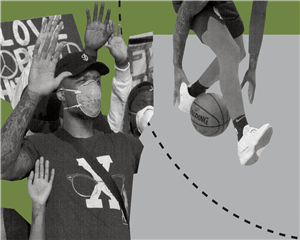A postgame interview offers a reminder that the spectacle of public life is best backed up with real work.
赛后的采访提醒我们,壮观的公众生活是由真正的工作来支撑的。
By Jason Zengerle.
文/杰森·曾格尔
The scene is so familiar that it's practically banal.
这个场景太熟悉了,简直是平谈无奇。
Damian Lillard, the Portland Trailblazers' All-Star guard, stands on a basketball court, covered in sweat and breathing heavily, fresh from scoring 50 points to lead the Blazers to a comeback win last month.
波特兰开拓者队全明星后卫达米恩·利拉德站在篮球场上,浑身是汗,喘着粗气。上个月,他刚刚拿下50分,带领开拓者队逆转胜利。
From a TV studio far away, Dwyane Wade, an All-Star guard turned commentator, asks Lillard how he manages to make commercials, record music, raise three children and still drain 3-point shots from near half-court.
在远程的电视演播室里,由全明星后卫转行做解说员的德怀恩·韦德问利拉德,他是如何做到拍广告、录制音乐、抚养三个孩子,还能在近半场不停地投出三分球的。
This is where the script calls for Lillard to fall back on the usual jock clichés about thanking God and taking it one game at a time.
剧本要求利拉德回到通常的运动员的陈词滥调上,如感谢上帝,仅是看做一场比赛。

Instead, he moves in a different direction. “None of those things that you just named would be possible without the work,” Lillard says.
相反,他却转移了话题。利拉德说:“如果没有这项工作,你刚才提到的那些东西都不可能实现。”
“I wasn't a highly touted middle school player, high school player or college player. I had to do my work behind the scenes.”
“我不是一个被高度吹捧的初中球员、高中球员或大学球员。幕后我得做好我的工作。”
He goes on to recall what it was like “to not have the lights on you and to want to be seen” and the methodical process involved in escaping that condition.
他接着回忆起“没有聚光灯追着你,又却想被人看到”的感觉,以及摆脱这种状况的过程。
Then, summoning the underdog spirit of Rocky Balboa and the Protestant ethic of Max Weber,
接着,他引用了洛奇·巴尔博亚的失败者精神和马克斯·韦伯的新教伦理,
he says: “I don't forget those steps that it took for me to get here. So even though I got a family and I got all these commercials and these endorsements, I don't forget the thing that makes all of those things possible. Which is the work, the discipline.”
说道:“我没有忘记我走到今天所经历的那些步骤。因此,尽管我有了家庭,有了广告,有了代言,我没有忘记是什么让这一切成为可能,那就是工作和纪律。”
译文由可可原创,仅供学习交流使用,未经许可请勿转载。












